
2017 was my best reading year yet. It was also the first year I didn’t set a reading goal. I noticed a tendency in myself when I had some arbitrarynumber of books to read that I tended to pick out the shortest and lightest books and avoided the longest and densest ones.
I committed instead to reading an hour per day and tackling whichever books I thought would most impact my thinking.
This helped me both prioritize some denser books I’d been avoiding and made me quicker to quit books that didn’t seem worth the effort.
The result was that I read more than a few books which deeply impacted my thinking and I suspect will do so for years to come.
Here they are:
January
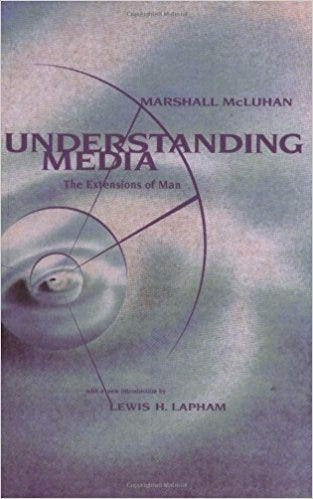
Understanding Media: The Extensions of Man
Marshall McLuhan
90% of the time I was reading this book I was wondering “what is he talking about?”
The other 10% I was thinking: “That’s the most brilliant thing I’ve ever heard.”
Originally published in 1964, it still reads like it’s hot off the presses of the future. McLuhan, probably the most famous media theorist of all time, is often cited by tech and media executive as a formative influence on how they think about the impact of technology on society. WIRED Magazine in particular credits McLuhan as their founder.
Understanding Media leaves you with plenty to think about how technology is and will impact society.
Some quotes to give you a sense:
“the medium is the message” because it is the medium that shapes and controls the scale and form of human association and action.
Print created individualism and nationalism in the sixteenth century. Program and “content” analysis offer no clues to the magic of these media or to their subliminal charge.
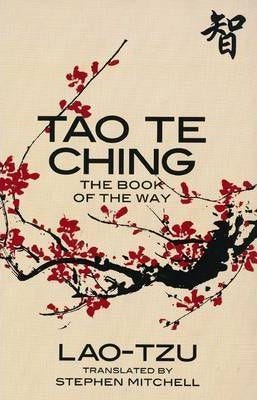
Tao Te Ching
Lao-Tzu
This was one of those books where I felt like the first reading was like taking a lick of icing off the cake. It was wonderful but I felt like I was still missing the bulk of the experience (which is what re-reads are for!)
I won’t attempt to summarize, but here’s a selection of some of my favorite lines:
“The highest excellence is like (that of) water. The excellence of water appears in its benefiting all things, and in its occupying, without striving (to the contrary), the low place which all men dislike. Hence (its way) is near to (that of) the Tao
When the work is done, and one’s name is becoming distinguished, to withdraw into obscurity is the way of Heaven.
Who can (make) the muddy water (clear)? Let it be still, and it will gradually become clear. Who can secure the condition of rest? Let movement go on, and the condition of rest will gradually arise
He whose (desires) are few gets them; he whose (desires) are many goes astray.
The sage has in the world an appearance of indecision, and keeps his mind in a state of indifference to all.
Words that are strictly true seem to be paradoxical.”
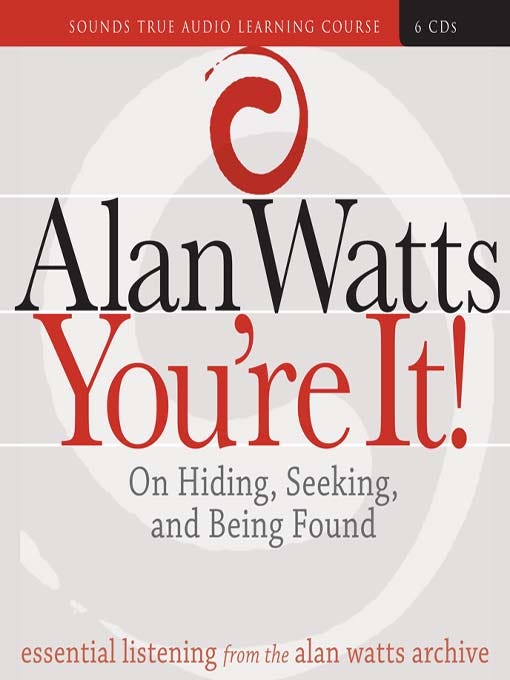
You’re It!: On Hiding, Seeking, and Being Found
Alan Watts
My first introduction to Alan Watts was through his recordings called Out of Your Mind. You’re It! is also best listened to on audio as Watts is one of those thinkers who is a better speaker than writer.
Watts was one of the first translators of Zen, Hinduism and other Eastern traditions and modes of thought into a language that made sense to people raised in the West. I find Watts both enlightening and funny to listen to and his concept sof “the universe as play” and “life as drama” have impacted me a great deal.
February
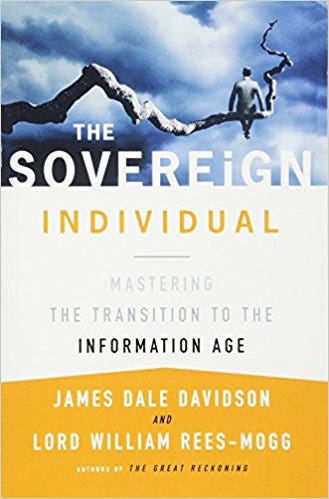
The Sovereign Individual: Mastering the Transition to the Information Age
Davidson, James Dale
Originally published in 1997, this book got a lot of play in my Twitter feed around the 2016 election for eerily good predictions about a rising nationalism, “A decline in the status and power of traditional elites, as well as a decline in the respect accorded the symbols and beliefs that justify the nation-state.”
It’s been widely cited as one of the most influential books on bitcoin creator,Satoshi Nakamoto and is one of the books I’ve found most helpful for thinking about the implications that cryptocurrency may have on our society.
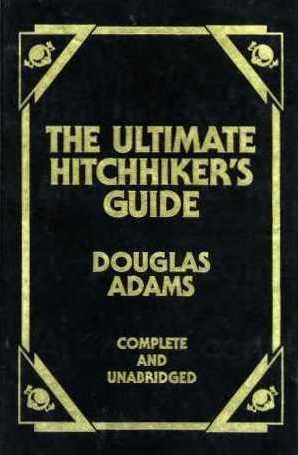
The Ultimate Hitchhiker’s Guide to the Galaxy
Douglas Adams
I originally read the Hitchhiker’s Guide to The Galaxy when I was 16 and it is in the running for my favorite book of all time. I re-read it at least every couple of years and when I found out the original radio show versions were available on Audible (Part 1 and Part 2), it was a perfect time to re-listen.
Adams has a brilliant mind and a wicked sense of humor to go with it. He turns them both to the tale of Arthur Dent, who, seconds before Earth is demolished to make space for a galactic freeway, is plucked off the planet by his friend Ford Prefect, a researcher for the revised edition of The Hitchhiker’s Guide to the Galaxy. Prefect has, logically, spent the last fifteen years posing as an out-of-work actor while stranded on Earth.
Be advised that this book quite literally contains the answer to Life, the Universe, and Everything.
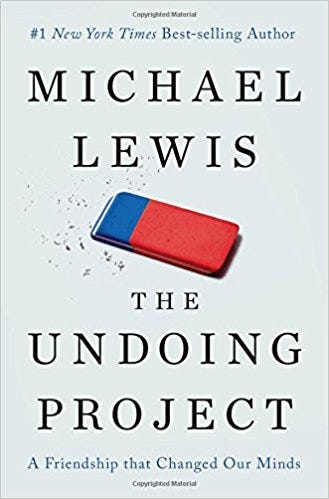
The Undoing Project: A Friendship That Changed Our Minds
Michael Lewis
Malcolm Gladwell called Michael Lewis, “the most underrated author alive,” which I can’t disagree with.
The Undoing Project is Lewis’s account of the story of Daniel Kahneman and Amos Tversky, the two founders of what has come to be called behavioral psychology and the only psychologists to ever win the Nobel Prize in Economics.
Some reviewers complained the book was “not the easiest read” and compared to Lewis’s earlier books that true, but compared to Kahneman’sThinking Fast and Slow, it was downright breezy. That makes an accessible intro to behavioral psychology as well as its impact on economics.
The book also tells the intellectual love story of Kahneman and Tversky’s partnership and the incredible 2+2=23 calculus that resulted. It got me thinking once again about partnerships and how much upside there is to good ones.
March
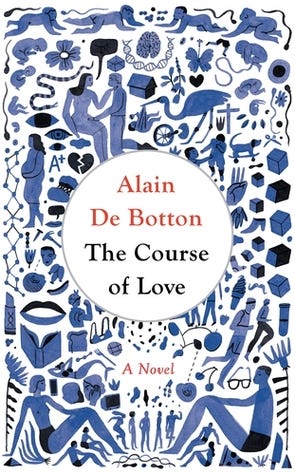
The Course of Love
Alain de Botton
I was first exposed to de Botton through his book Status Anxiety which I picked up on a lark after a friend emailed me about it. I ended up devouring it over the course of two or three days. He was incisive and honest about how we really think of our social status and did so in a way that didn’t feel Machiavellian.
In The Course of Love, he tells the story of a couple from first meeting to dating to marriage to kids and offers his usual incision and honesty on romantic relationships and their role in our society and our lives.
“The only people who can still strike us as normal are those we don’t yet know very well. The best cure for love is to get to know them better.”
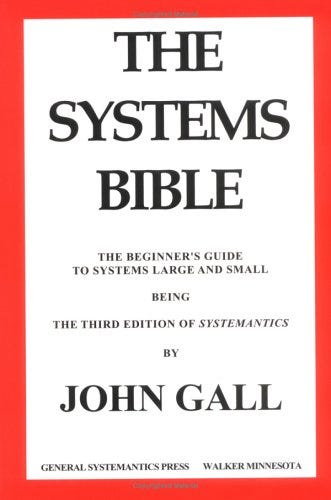
The Systems Bible: The Beginner’s Guide to Systems Large and Small: Being the Third Edition of Systemantics
John Gall
Complex systems are one of my favorite subjects and The Systems Bible is a great entry in the genre.
Simple systems are a sum of their parts: a bike is just a bunch of parts. If you take a wheel off and replace it with another, no big deal.
In a complex system, the whole is greater than the sum of its parts. If you take the heart out of a horse and then replace it a few hours later, it doesn’t start working again like a bike. This does not mean we can’t understand complex systems, only that they play by a different rulebook which The Systems Bible attempts (and largely succeeds) at capturing with quotes like:
“A complex system that works is invariably found to have evolved from a simple system that worked. A complex system designed from scratch never works and cannot be patched up to make it work. You have to start over with a working simple system.”
and
“SYSTEMS TEND TO MALFUNCTION CONSPICUOUSLY JUST AFTER THEIR GREATEST TRIUMPH:
Toynbee explains this effect by pointing out the strong tendency to apply a previously-successful strategy to the new challenge:
THE ARMY IS NOW FULLY PREPARED TO FIGHT THE PREVIOUS WAR
For brevity, we shall in future refer to this Axiom as Fully Prepared for the Past(F.P.F.P.)”
April
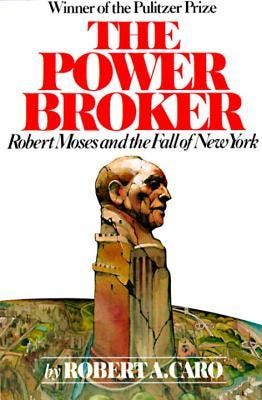
The Power Broker: Robert Moses and the Fall of New York
Robert A. Caro
Epic. Absolutely epic. A 1200 page study of power told through the life of Robert Moses, the master builder of New York. For forty years, from 1930–1970, Robert Moses ruled the parks and infrastructure departments of New York (state and city). By the time he left office, he had built 658 playgrounds in New York City alone, plus 416 miles (669 km) of parkways and 13 major bridges. There is not a section of New York City he did not touch. In The Power Broker, biographer Robert Caro offers us a look at Robert Moses, focused around a single question: How does one individual amass so much power?
You can read my summary and analysis here
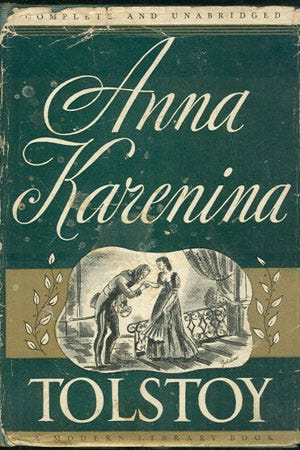
Anna Karenina
Leo Tolstoy
You know those fiction books you read where the characters feel sort of two dimensional and not real? The plot is entertaining, but you think “that’s not how the world really works.”
Imagine the exact opposite of that and you’ve got Anna Karenina. The characters are so vivid and the feeling so real. I’m not sure I’ve ever read someone as perceptive as Tolstoy and the writing itself (particularly the use of metaphor) is astoundingly good. Some of my favorite lines:
“Happy families are all alike; every unhappy family is unhappy in its own way.”
“He so well knew that feeling of Levin’s, that for him all the girls in the world were divided into two classes: one class — all the girls in the world except her, and those girls with all sorts of human weaknesses, and very ordinary girls: the other class — she alone, having no weaknesses of any sort and higher than all humanity.”
“All one has to do is not spoil children, not to distort their nature, and they’ll be delightful.”
At every step he found his former dreams disappointed, and new, unexpected surprises of happiness. He was happy; but on entering upon family life he saw at every step that it was utterly different from what he had imagined. At every step he experienced what a man would experience who, after admiring the smooth, happy course of a little boat on a lake, should get himself into that little boat. He saw that it was not all sitting still, floating smoothly; that one had to think too, not for an instant to forget where one was floating; and that there was water under one, and that one must row; and that his unaccustomed hands would be sore; and that it was only to look at it that was easy; but that doing it, though very delightful, was very difficult.
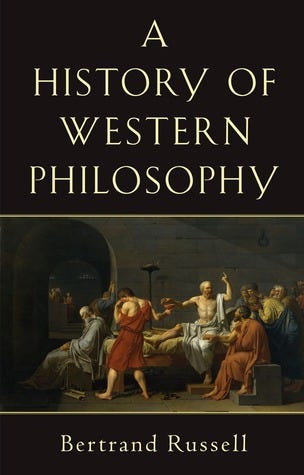
A History of Western Philosophy
Bertrand Russell
I’ve been sort-of meandering my way through philosophy for the last few years and felt like I needed a scaffolding to stand on.
Russell’s A History of Western Philosophy provided that scaffolding.
It’s a survey of Western philosophy beginning with the pre-Socratic Greeks up to the mid-20th century when Russell wrote the book.
Russell is funny and not afraid to inject his own feelings into the book which made it more readable and entertaining than other survey books I’ve read.
May
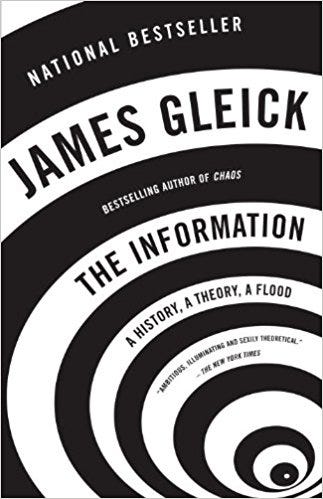
The Information: A History, a Theory, a Flood
James Gleick
An exploration of some of the most important idea of the modern era: information, communication and information theory.
Gleick, who I first discovered through his more famous book Chaos, does a masterful job with a subject which seems esoteric at first glance but has tremendous implications on the world we live in.
Beginning with the language of Africa’s talking drums and weaving his way through the written alphabet, cyphers in the First and Second World Wars, and Claude Shannon’s Information Theory, Gleick looks at exactly what information is and how it affects our lives.
I found myself audibly saying “wow” almost every chapter.
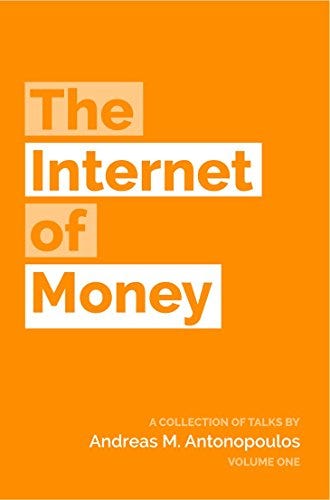
The Internet Of Money
Andreas M. Antonopoulos
I started getting interested in cryptocurrency last year but resisted really diving in because I as soon as I started reading about it I was hit with a wall of terminology that I couldn’t parse: hash power, merkle trees,ECC keys, nonce, etc.
The Internet of Money was written as edited speeches for a general purpose audience that was sophisticated enough to be interesting but accessible enough to let me get my bearings.
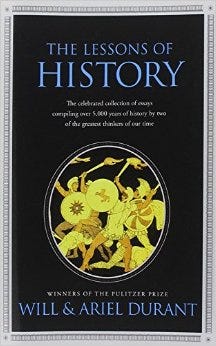
The Lessons of History
Will and Ariel Durant
An unusual combination of brief and thought provoking .Will and Ariel Durant spent their entire careers (four decades) writing a ten volume history of the world.
In The Lessons of History, they attempt to distill all they learned into a short, 120 page read.
The Durants weigh in on biology, race, morals, economics, government and whether progress is real. I found plenty of gems in this one though I also disagreed with some of the Durant’ conclusions and reading this forced me to think about why.
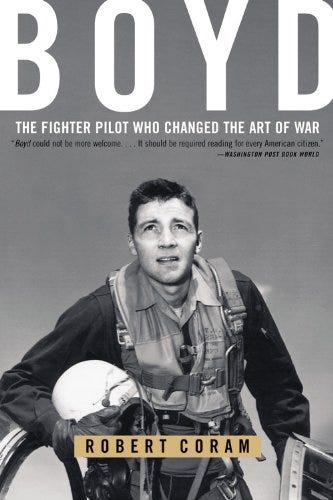
Boyd: The Fighter Pilot Who Changed the Art of War
Robert Coram
I absolutely devoured this book. Boyd is most well known for his idea of the OODA loop and it’s military applications, but has a tremendous depth of thought behind and beyond OODA (Observe-Orient-Decide-Act).
As a military theorist, he is tossed around in the same sentences as Sun Tzu and Von Clausewitz. Some see a direct intellectual lineage running from Sun Tzu to Genghis Khan to Miyamoto Musashi to Mao Tse Tung to Boyd and such comparison do not seem unmerited.
Boyd’s work has been adopted by much of the startup world because his work most looks at how a smaller force can utilize strategy to outcompete larger opponents.
This biography by Coram is probably the best entry point to his work though Certain to Win was also excellent for seeing his theories applied to business. I listened to it on audiobook. If you’d like a briefer (albeit not brief) introduction, I did a write-up on Boyd and OODA loops here.
June
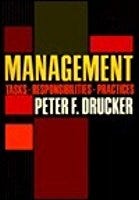
Management: Tasks, Responsibilities, Practices
Drucker, Peter F.
It’s not an exaggeration to call Peter Drucker the father of the modern corporation and modern management.
He was also a historian and Management is as good of a history of the 20th century corporation as I’ve found.
At more than 500 pages it is a fairly comprehensive survey of Drucker’s body of work (his “best of” if you will). This revised edition integrates Drucker’s findings from then until his passing in 2005 at age 95.
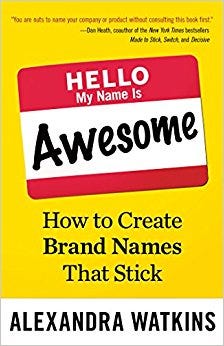
Hello My Name is Awesome
Alexandra Watkins
At 70 pages, this is a short, straightforward guide for how to name products, services and brands.
It’s far and away the best thing I’ve read on the subject with a straightforward methodology that anyone can use.
July
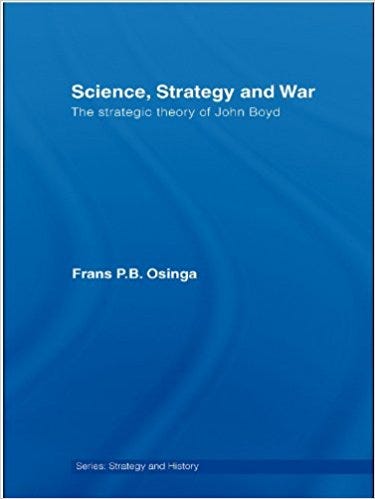
Science, Strategy and War:The Strategic Theory of John Boyd
Frans P.B. Osinga
I went from getting intrigued about Boyd’s ideas on Ribbonfarm, to learning about his life in the highly enjoyable biography by Coram, from there to getting a handle on the application of his ideas to business in Certain to Win, and finally committed to reading his full papers.
Science, Strategy and War is a PhD thesis which makes an excellent companion read to Boyd’s papers offering a lot of context around the state and history of warfare and Boyd himself.
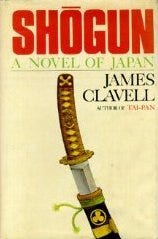
Shōgun
James Clavell
An epic work of historical fiction. The book follows an English navigator who washes ashore in 17th Century Japan and proceeds to become caught up in the strife and war that would usher in the Tokugawa era at the battle of Sekigahara.
This book has it all: intrigue, diplomacy, romance, tragedy, warfare, and ninjas. I found it was great for listening to on long walks.
It offers a fascinating look at the state of the world in 1600, when Japanese cities and civilization made the Europeans look backwards in all but their seafaring abilities.
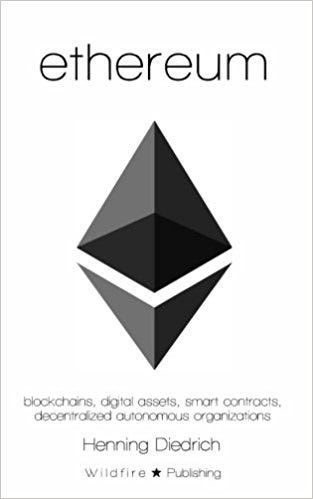
Ethereum: Blockchains, Digital Assets, Smart Contracts, Decentralized Autonomous Organizations
Henning Diedrich
This book is a fun-to-read overview of Ethereum and how it compares to other cryptocurrencies.
While this book contains code, it’s not a dry read at all. The book also focuses a lot on smart contracts implications for the future.
I left it at a friend’s house who had been hearing me talk about cryptocurrency for the last few years and he said this was the book that finally showed him why I believed it had significant potential.
The gold is the last 50 pages of the book or so which gives a good history of Bitcoin and Ethereum that helped me better contextualize the industry news I was reading.
August
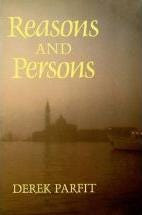
Reasons and Persons
Derek Parfit
Derek Parfit was a British philosopher who specialised in personal identity, rationality, and ethics. He is widely considered one of the most important and influential moral philosophers of the late 20th and early 21st centuries. This book is his most famous work.
If you really want to think about ethics, consequentialism, and/or self-interest theory, this is the book for you. Part 3 on the notion of “self” being a false construct is both the best part and the easiest to read so you might start there.
If you’re interested in more detail, I wrote a longer summary here.
September
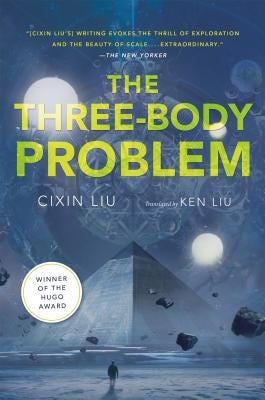
The Three-Body Problem
Liu Cixin
Generally considered the best Chinese sci-fi ever written, The Three-Body Problem won the Hugo award in 2015, basically a geek’s version of the Pulitzer Prize.
Liu Cixin mixes nanoscience, string theory, astrophysics and religion in with a history of the Cultural Revolution.
It changed the way I looked at the night sky, how I perceived time and human beings’ place in the universe.
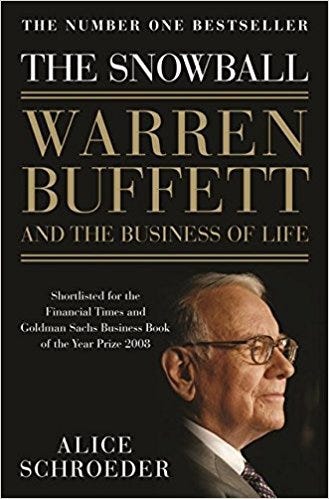
The Snowball: Warren Buffett and the Business of Life
Alice Schroeder
Finishing a good biography often feels like saying goodbye to an old friend. I found The Snowball a particularly hard book to say goodbye to. I typically try to avoid reading biographies of still-living figures as there seems to be too much politics involved to get at the core. I eventually caved on this one after so many friends recommended it to me and I’m glad I did. I thought Schroeder did a superb job of showing Buffett in a nuanced light.
The sacrifices he made in his home life and with family for his investing career were made clear but not overdramatized.
I think it’s particularly important (and interesting) how underdeveloped public markets were when Buffett started investing. So much of Buffett’s early success seems to boil down to a much less transparent market where he was able to get an edge by being such a voracious reader and student of markets. There doesn’t seem to be much of that left in public markets today and I suspect if Buffett were coming of age as an investor today, he would be looking for other vehicles.
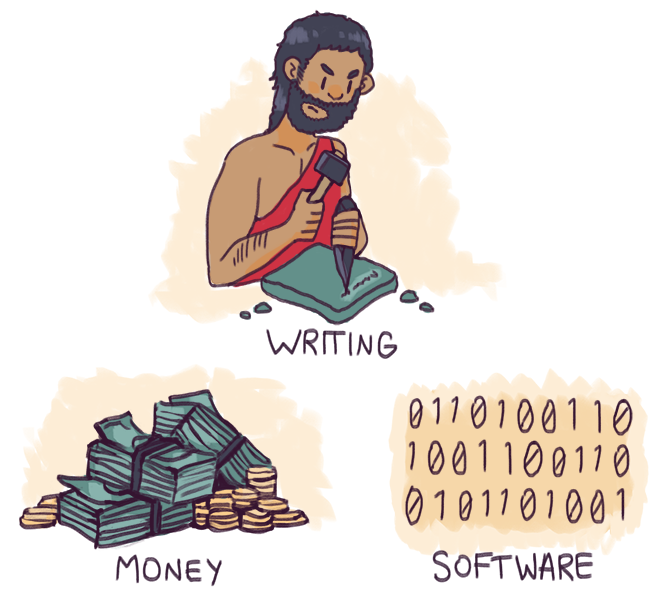
Breaking Smart — Season 1
Venkatesh Rao
Much of the commentary around tech right now is negative, but Breaking Smart makes an intellectually rigorous case for how a world eaten by software may be the best one yet.
Rao borrows theories and ideas from Economics, Cultural History, and Software Development to suggest a way of thinking about what’s going in the world and where the future is headed.
If you work in any industry that is touched by software (which is quickly becoming all of them), I think this is a good introduction to understanding how software changes the rules.
if you only read one chapter, the Tinkering vs. Goals is my favorite.
October
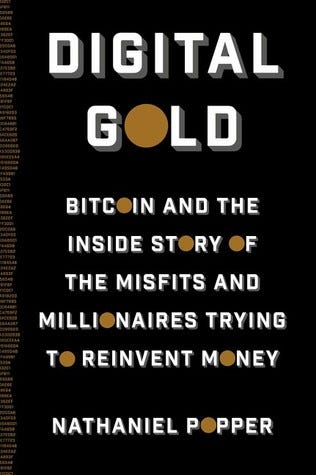
Digital Gold: Bitcoin and the Inside Story of the Misfits and Millionaires Trying to Reinvent Money
Nathaniel Popper
A narrative nonfiction account of the rise of Bitcoin. In the spirit of authors like Michael Lewis, Popper traces the history of bitcoin starting from a cypherpunk mailing list through the ultra-libertarian regime and into our present, more Silicon Valley dominated, era.
The narrative structure of the book makes it very accessible. In truth, it reads more like a thriller than a tech book. Though bitcoin may be “decentralized,” it still retains much of its founders and early adopters DNA and Popper did a good job of capturing that.
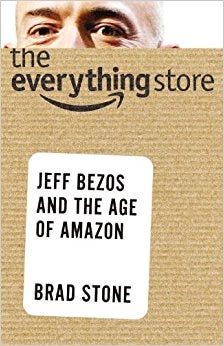
The Everything Store: Jeff Bezos and the Age of Amazon
Brad Stone
I somewhat jokingly tweeted after the news that Amazon bought Whole Foods “I for one welcome our new Amazon overlords.” I say somewhat, of course, because Amazon’s rise has been so meteoric that and shows no signs of slowing down. I wanted to get a better understanding of the cultural DNA of the company to have some sense for how they behave and felt this book did a good job.
The book is as much about Jeff Bezos as it’s about Amazon. Though some dispute the characterization, this book introduces you not to the nerdy, funny Bezos of product launch videos, but the cut-throat, power-driven, Wall-street side.
Related Article: Why Amazon is Eating the World
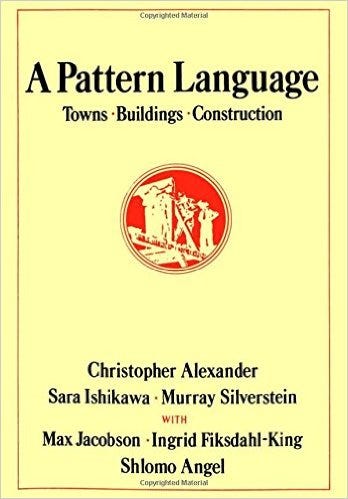
A Pattern Language: Towns, Buildings, Construction
Chris W. Alexander, Sarah Ishikawa, et al
I went to an architecture conference about two years ago, not because I knew anything about architecture, but just because I wanted to see one speaker. However, all the speakers ended up being fascinating and it made me reconsider how significant architecture and design is to my everyday life. A door handle that is inconvenient to turn can set the mood for everyone walking into an office (or vice versa).
When I asked what book I should start with to better understand architecture, A Pattern Language was the nearly unanimous recommendation. It sat on my shelf for a year or so but when I moved apartments, that seemed like a good reason to dust it off and flip through it.
And wow, what an absolutely delightful book. You get the sense reading it of what a labor of love it must have been to research and write.
The book is organized as a very practical how to design the space around you starting at the level of nation-states and descending down to how you put lamps and shelves around you in your home. It’s written to be skimmable if you just want to flip through the section applicable to you so don’t be daunted by the 1,000 pages.
If you want to get a sense of the style, the primary author, Christopher Alexander, wrote a great magazine piece in 2016 on architecture and God.
November
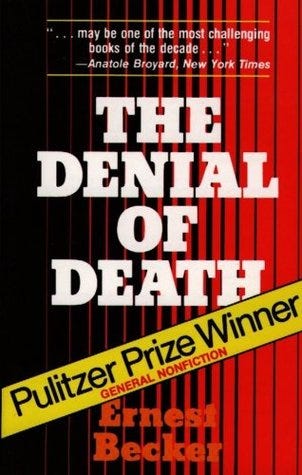
The Denial of Death
Ernest Becker
The winner of the 1974 Pulitzer Prize and the culmination of a career, The Denial of Death is a brilliant work.
Becker argues, convincingly, that evolution has brought individuals to a point where we are trapped between our “creatureliness” and “symbolic self.” Consciousness has made us aware of our own powers, but also of our miserable creatureliness and destiny to die.
This insight allows Becker to explain and re-interpret human nature and history in a new, and fruitful, light.
Some choice quotes:
“those who speculate that a full apprehension of man’s condition would drive him insane are right, quite literally right.”
“To grow up at all is to conceal the mass of internal scar tissue that throbs in our dreams.”
“early men who were most afraid were those who were most realistic about their situation in nature, and they passed on to their offspring a realism that had a high survival value. The result was the emergence of man as we know him: a hyper-anxious animal who constantly invents reasons for anxiety even where there are none.”
My full list of quotes and notes here.
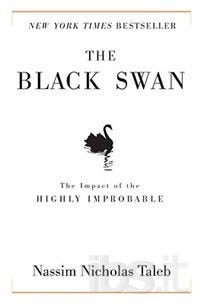
The Black Swan
Nassim Nicholas Taleb
I read the Black Swan for the first time when I was a senior in college and it was a formative book for me. It was just after the 2008 crisis and I had a vague sense that every authority figure I’d ever listened to was completely full of shit.
The Black Swan convinced that was basically the case and I would have to build my own models and understanding of how things actually worked. The Black Swan itself contributed a lot to that new model and is still a big part of how I see the world.
Re-reading it was well worth it. I picked up a couple of things I didn’t catch the first time around like the distinction between grey swans and black swans and the notion of “Platonicity.”
If you haven’t picked up anything by Taleb, I think Fooled by Randomness is the best entry point.
December
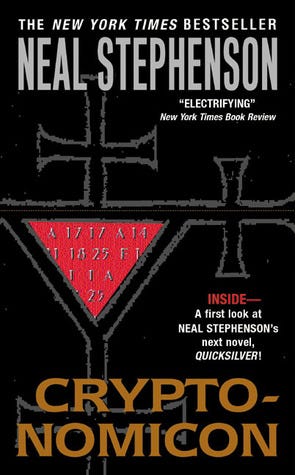
Cryptonomicon
Neal Stephenson
A piece of cypherpunk lore with plenty of World War II history to boot.
Cryptonomicon weaves a fast-paced narrative along with an incredible attention to detail about the math and science of cryptography and computing.
It tells the parallel stories of a World War II codebreaker and his entrepreneur grandson attempting to use his grandfather’s work to build a cryptocurrency in the fictional Sultanate of Kinakuta.
Their goal is to facilitate anonymous Internet banking using electronic money and (backed by a gold vault in Kinakuta), with the eventual goal of being able to distribute Holocaust Education and Avoidance Pod (HEAP) media for instructing genocide-target populations on defensive warfare.
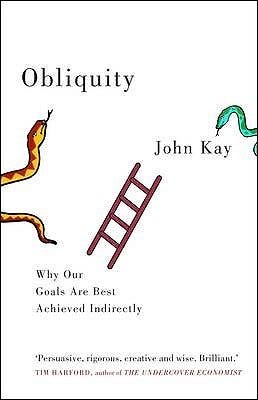
Obliquity: Why Our Goals are Best Achieved Indirectly
John Kay
A convincing argument against setting long-term goals. This book took many of the learning of complexity science over the past few years and showed how many companies and individuals ignore them, to their detriment.
Great companies and lives are built not from un an erring focus on a long-range goal as many commentators would have you believe, but on an indirect and oblique approach that realizes reality is more complex than our reductionist plans would admit.
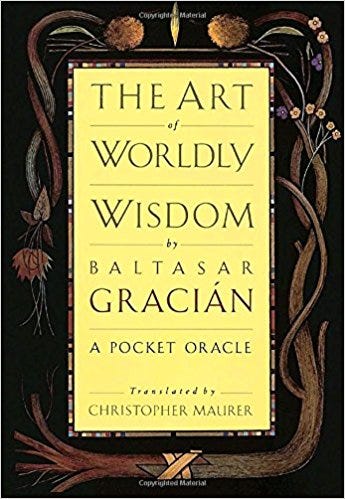
The Art of Worldly Wisdom
Balthasar Gracian
A 300 year old book of maxims on how to live well yet effectively. Gracian is insightful and cunning as Machiavelli but as scrupulously honorable as Marcus Aurelius.
This book was imminently quotable. Here are just a couple:
Freedom is more precious than any gifts for which you may be tempted to give it up. Lay less stress on making many dependent on you than on keeping yourself independent of any. The sole advantage of power is that you can do more good.
We do not think much of a man who never contradicts us that is no sign he loves us, but rather that he loves himself. … it should disturb us if our affairs please every one, for that is a sign that they are of little worth. Perfection is for the few.
If you enjoyed this…
I study business strategies and mental models then explain how you can apply them to your life and business. Drop your email here to get my best writing and a list of my favorite tools for entrepreneurs and creatives, free.
P.S. I’m always looking for book recommendations. If there’s something you think I should read, let me know!
Last Updated on June 7, 2025 by Taylor Pearson

